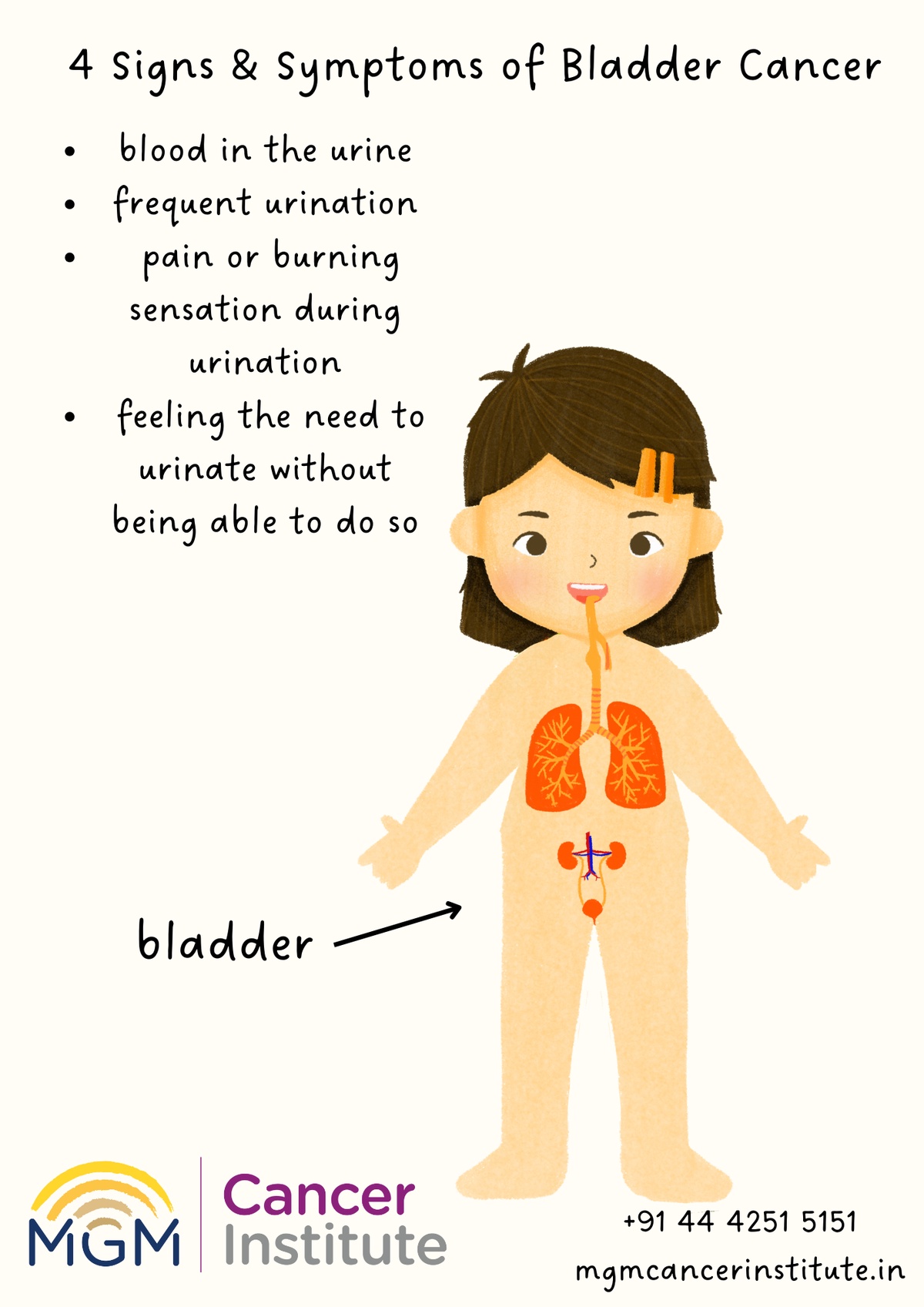Learn about the signs and symptoms of bladder cancer. Find expert insights and guidance at a leading Cancer Hospital in Chennai.
Common signs of bladder cancer include:
-
Hematuria (blood in the urine): This is the most common symptom of bladder cancer. Blood may be visible in the urine or may be microscopic, detected only through urine tests.
-
Changes in urinary habits: Bladder cancer can cause changes in urinary patterns such as increased frequency of urination, urgency, or pain during urination (dysuria).
-
Pelvic pain or discomfort: Persistent pain or discomfort in the pelvic area, particularly around the bladder, can be indicative of bladder cancer.
-
Back pain: Advanced bladder cancer may lead to lower back pain, particularly if the cancer has spread to nearby tissues or organs.
Bladder cancer can affect urinary patterns in several ways:
-
Increased Frequency: People with bladder cancer may experience a frequent need to urinate, often with only small amounts of urine being passed each time.
-
Urgency: There may be a sudden and intense urge to urinate that cannot be delayed.
-
Dysuria: Bladder cancer can cause pain or burning sensations during urination (dysuria).
-
Hematuria: Blood in the urine (hematuria) is a common symptom of bladder cancer. This blood can make the urine appear pink, red, or cola-colored.
-
Changes in Urinary Stream: Bladder cancer may cause changes in the force or stream of urine, including weak or interrupted flow.
-
Difficulty Emptying the Bladder: Some individuals with bladder cancer may have difficulty fully emptying their bladders, leading to a sensation of incomplete emptying.
-
Nocturia: Bladder cancer can also contribute to increased nighttime urination (nocturia).
Cancer hospitals in Chennai typically offer a comprehensive range of treatment options for bladder cancer, including:
-
Surgery: Different surgical procedures may be performed depending on the stage and extent of the bladder cancer. These may include transurethral resection of the bladder tumor (TURBT), partial or radical cystectomy (removal of part or all of the bladder), and urinary diversion surgeries.
-
Chemotherapy: Chemotherapy drugs may be used to treat bladder cancer, either alone or in combination with other treatments. Chemotherapy can be administered intravenously or directly into the bladder (intravesical chemotherapy).
-
Immunotherapy: Immunotherapy drugs such as Bacillus Calmette-Guerin (BCG) therapy are often used to treat early-stage bladder cancer or prevent its recurrence after surgery. Immunotherapy helps boost the body's immune response to target and destroy cancer cells.
-
Radiation Therapy: Radiation therapy uses high-energy beams to target and kill cancer cells. It may be used as a primary treatment for bladder cancer in some cases or in combination with surgery and/or chemotherapy.
-
Targeted Therapy: Targeted therapy drugs are designed to specifically target and disrupt certain pathways or proteins involved in cancer growth and progression. These drugs may be used for advanced or metastatic bladder cancer that hasn't responded to other treatments.
-
Clinical Trials: Cancer hospitals in Chennai may also offer access to clinical trials investigating new and innovative treatment approaches for bladder cancer.
-
-
Early detection plays a crucial role in the prognosis and outcomes of bladder cancer. Here's why:
-
Treatment Options: When bladder cancer is detected in its early stages, treatment options are often more effective and less invasive. Early-stage bladder cancer may be treated with less aggressive interventions such as transurethral resection of the bladder tumor (TURBT) or intravesical therapy, which can help preserve bladder function and quality of life.
-
Improved Survival Rates: Early detection allows for prompt initiation of treatment, which can lead to better overall survival rates. Patients diagnosed with early-stage bladder cancer generally have a more favorable prognosis compared to those diagnosed at advanced stages.
-
Reduced Risk of Disease Progression: Detecting bladder cancer early may help prevent its progression to more advanced stages, which are associated with a higher risk of metastasis (spread to other organs) and poorer outcomes.
-
Preservation of Bladder Function: In cases where bladder cancer is detected early, it may be possible to preserve bladder function and avoid the need for radical surgeries such as cystectomy (removal of the bladder). This can significantly improve a patient's quality of life and urinary function.
-
Lower Treatment Burden: Early-stage bladder cancer often requires less aggressive treatment, leading to fewer side effects and a reduced burden on patients and their families.


No comments yet